The members of an ethnic group who cease striving to preserve their ethnic genetic interest have their inclusive fitness — their adaptiveness — reduced to the individual fitness of children and close family. They are, in effect, leaving their ethnic genetic capital to chance — the vagaries of nature and the good-will of competing groups. — Frank Salter
It may seem ironic that one of the most canonical pro-white and pro-white nationalist works ever written hardly mentions the white race at all. But it really isn’t ironic. Since White Nationalism is moral and perfectly natural, based on quantifiable genetic data, and a subcategory of universal ethnic nationalism, any work providing its biological, evolutionary, and theoretical underpinnings need not mention a specific race. What applies to whites applies to all races and ethnicities that aspire to nationalism.
Frank Salter’s 2003 classic On Genetic Interests posits that all people have genetic interests, which Salter defines as “the number of copies of an individual’s distinctive genes.” During the twentieth century, most theorists focused on how genetic interests apply to family and extended kin. Since siblings and cousins share genes at a greater frequency than with random non-family members, it follows that an individual express loyalty to family more than with non-family. This loyalty often takes the form of altruism. In the most extreme cases it denotes how the sacrifice of one’s life to save another’s can make the family or clan more evolutionarily fit — depending on genetic closeness and the number of individuals being saved.

You can buy Spencer Quinn’s novel White Like You here.
Ethologist William Hamilton coined the term “inclusive fitness” in 1964 to describe how an individual can affect the genetic interests of a family or clan which shares certain gene frequencies. Salter’s innovation was to expand inclusive fitness to include ethnic groups and races — which makes sense given that by 2003 mass migration into the West had become impossible to ignore. He views an ethnic group (or ethny) as a greatly extended family, and a race as a collection of closely related ethnies. Races also have unique gene frequencies, just as ethnies and families do, which means that members of races have a natural — and indeed, moral — obligation to protect their genetic interests.
The ramifications of such an idea are, of course, enormous. Salter proposes nothing less than a lucid political system which incorporates genetic continuity and adaptive behavior. These are ends in and of themselves, since we value life for its own sake and do not need to offer proofs as to why we wish to live and procreate. Salter describes in Darwinian terms a formidable obstacle preventing the fulfillment of genetic interests: competition from what he calls “proximate interests,” such as wealth and status, which also motivate human behavior — sometimes to increase fitness, and sometimes not.
The main problem is the slowness of natural selection compared to the rapidity of technological and social change since the Neolithic. The inertia of adaptations can cause them to continue to promote proximate interests that no longer serve fitness.
Drawing on J. Philippe Rushton’s Genetic Similarity Theory, Richard Dawkins’ concept of populations behaving as “superorganisms,” Edward O. Wilson’s theory of micro-evolution, and other prominent sociobiological ideas, Salter lays out a metric to determine genetic relatedness and uses gene mapping to mathematically calculate how behavior impacts genetic interest (or what he calls “an individual’s familial genetic stake”). Values in his equations include genetic relatedness, group size, and the genetic difference between competing races or ethnies — all of which can be quantified.
Salter provides the following graph to demonstrate genetic relatedness among European populations.[1]
He then provides the following table to demonstrate genetic relatedness among global populations.
Note that the numbers above divided by 10,000 correspond to the X-axis of the previous graph. Thus, the genetic distance between the English (red square) and the Danes (blue square) is a mere 0.0021, while the genetic difference between the English and the Bantus (green square) is a whopping 0.2288. We would have to zoom out quite a bit to map that distinction on the above graph.
Salter describes how this would play out in real life using mathematical formulae developed by Henry Harpending in his 1979 American Naturalist essay “The Population Genetics of Interactions.” If 100 ethnic Danes replace 100 ethnic English in England, according to DNA data 1.67 English children’s worth of unique genetic data would be lost forever. This tiny figure is a function of the genetic similarity between the English and Danish, as well as the small number of individuals being replaced. On the other hand, replacing 100 English with 100 Bantus would lose about 108.5 English children’s worth of genetic interest. This is because English and Bantu DNA are that different.[2]
Although Salter readily admits that Bantu genetic interests would be equally reduced if 100 English were to replace 100 Bantus in Africa, the closest he comes to drawing qualitative conclusions is to point out that genetic interests include all heritable traits, not all of which are equally desirable:
Since adaptive ethnic altruism is homologous with extended kin selection, one is also defending all group qualities with high heritability, such as cognitive profile, personality, and physiognomy. Those differences are moderate within geographical races, but can be large between races. Moreover, there is growing evidence that differences in traits such as IQ have large effects on standard of living, both between individuals and ethnies within one society and between societies. So even if our critic rejects the value of ethnic kinship in its own right, he might embrace it if he cares about preserving for future generations the proximate values linked to it, such as culture and wealth.[3]
He also speaks out eloquently in favor of chauvinism:
A pronounced group identity usually results in group pride, the believe that one’s group is in some way distinguished. Notions of ethnic superiority are used as ideological weapons in inter-group competition, to bolster the ingroup’s confidence and break the spirit of other groups, in effect, claiming precedence for the assertive party. Chauvinism thus has its functions, and might be considered morally superior to arrows and hatchets as a means for conducting intergroup competition, but it should never be confused for truth.
Salter spends a lot of time on the problem of free riders. Such people benefit from misguided altruism and do not increase the ethny’s fitness. They can be of the same ethny as the altruist or an outgroup member. The free rider problem is reduced within a single ethny, since “members should be more willing to invest in the group the more dense the ties of kinship within it.” On the other hand, when outgroup members benefit from altruism, they have the added bonus of making their ethny fitter at the expense of the altruist’s. Thus, multiracial societies become rife with free riders, since free-riderism is a low-cost, high-reward form of ethnic and racial competition.

You can buy Spencer J. Quinn’s novel Charity’s Blade here.
One brilliant aspect of On Genetic Interests is Salter’s use of “fitness portfolios.” In these chapters, Salter describes strategies that ethnic groups can use to increase their own fitness at the expense of the fitness of competing groups. These include government-administered social controls, minority coalitions, separation/secession, and encouraging maladaptive behavior on the part of competing groups. Salter insists that all ethnies must be vigilant while defending their genetic interests unless they wish to face the eventual loss of their genetic uniqueness.
Various ideologies and religions provide strategies for this, and Salter compares them in the following fitness portfolios. These graphs map the ideal or intended expenditure towards a particular strategy, and are therefore impressionistic and not based on real data. They demonstrate how strategies differ when it comes to defending a person’s various interests — which can be separated into four broad categories: Self, Offspring, Ethny, and Humanity. All energy expended occurs after a person’s basic needs are met and adds up to a value of 1 along the Y-axis below:
One can quibble about whether the Nazis really promoted ethnic altruism over familial altruism to this degree, or whether capitalism prescribes such a vast differential between self and offspring, but the usefulness of the fitness portfolio should be clear. Any ideology or social, political, or economic system can have a fitness portfolio which places its intended behaviors in stark contrast with those of others. The fitness portfolio provides fertile ground for thought experiments, which could perhaps allow adherents of a particular system to reach a consensus more readily.
Salter prefers “universal nationalism” (in the second graph above) due to its balanced portfolio, and dedicates a chapter to its pros and cons. It would make sense that White Nationalism, which is a subset of universal nationalism, resembles that system most closely. But how closely? Perhaps timing would make a difference. How would White Nationalism 1.0 today, suppressed and demonized as it is, differ from White Nationalism 2.0 in a bona fide future white ethnostate?
Here is my stab at an answer. Feel free to argue in the comments:
Salters ends On Genetic Interests with a fascinating discussion of the ethics and workability of a biologically-informed political philosophy. He delves into utilitarianism as developed by Jeremy Bentham and John Stuart Mill, and then proposes adaptiveness as utility. He suggests that Darwinian fitness for the greatest number should replace happiness, pleasure, or wealth for the greatest number as the end goal. He argues that with classic utilitarianism, it is possible to have too much of a good thing. For example, a man with too many wives or too much wealth may enjoy a monopoly which might not impact the majority’s happiness in the short term, but could impact the population’s fitness in the long term. Lacking a survival ethic, utilitarianism suffers from an arbitrariness regarding what is considered good. But adaptive utility does not have this problem, since it is impossible to be too well adapted.
Salter fully concedes that his ideas are still very fresh, and that much more research and study must be performed before adaptive utility as a biologically-based political system can graduate to the exalted status of philosophy. In the meantime, we can review the quote from the beginning of this review and realize that with On Genetic Interests Frank Salter has done what few writers have been able to do: provide a coherent language and scientific mode of thought which nationalists everywhere can use to protect their genetic interests and fight for their very survival.
* * *
Like all journals of dissident ideas, Counter-Currents depends on the support of readers like you. Help us compete with the censors of the Left and the violent accelerationists of the Right with a donation today. (The easiest way to help is with an e-check donation. All you need is your checkbook.)
For other ways to donate, click here.
Notes
[1] Salter explicitly promotes European distinctiveness by debunking the theory of the relatively recent settlement of Europe by Near Eastern tribes 8,000 years ago, and also the theory that the European ethnies are so mixed that their ethnic kinship is effectively zero. According to Salter, Europeans “are a largely autochthonous people who can trace their origins back for several tens of thousands of years to a small number of founding tribes.”
[2] Despite the term not yet having been coined back in 2003, Salter presciently discusses the Great Replacement in On Genetic Interests:
Thus a fundamental, though by no means unique, threat to ethnic genetic interests is loss of the ethnic monopoly of a territory. The great advantage of this monopoly is that is facilitates continuity of the tribe’s gene pool by boosting the group’s ability to defend against mass immigration, whether violent or peaceful. . . . A decimated, defeated, or impoverished population has a chance to recover if it retains control of its territory. But a large-scale influx of genetically distant immigrants has the potential permanently to reduce the genetic interest of the original population.
I expressed a similar idea in my essays “Democrats Are the Real Racists (and Blacks Don’t Care)” and “If I Were Black I’d Vote Democrat.” American blacks consistently vote against their economic interests and tolerate much criminal behavior among their own because this is the best way to ensure territory for their ethny. Essentially, the near-constant state of poverty, violence, and disarray in black neighborhoods keep the non-blacks out and protect black genetic interests.
[3] Salter’s sources for this passage are texts which should be familiar to most Counter-Currents readers: Herrnstein and Murray’s The Bell Curve (1994), Rushton’s Race, Evolution, and Behavior (1995), and Lynn and Vanhanen’s IQ and the Wealth of Nations (2002). More recent texts which solidify the findings in these books are Vanhanen’s The Limits of Democratization (2009) (my review here), A Troublesome Inheritance (2014) by Nicholas Wade (discussed at length here), The Neuroscience of Intelligence (2017) (my review here), and Stephen Sanderson’s Race and Evolution (2022) (my review here).
Frank%20Salterand%238217%3Bs%20On%20Genetic%20Interests%0A
Share
Enjoyed this article?
Be the first to leave a tip in the jar!
Related
-
Counter-Currents Radio Podcast No. 582: When Did You First Notice the Problems of Multiculturalism?
-
Sperging the Second World War: A Response to Travis LeBlanc
-
Doxed: The Political Lynching of a Southern Cop
-
James M. McPherson’s Battle Cry of Freedom, Part 2
-
Problém pozérů aneb nešíří se snad myšlenky pravicového disentu až příliš rychle?
-
James M. McPherson’s Battle Cry of Freedom, Part 1
-
Slavery and the Weak Claim Paradox
-
National Socialism as a Magical Movement: Stephen E. Flowers’ The Occult in National Socialism
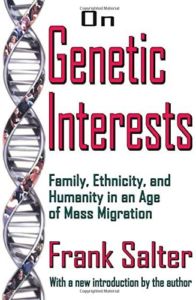
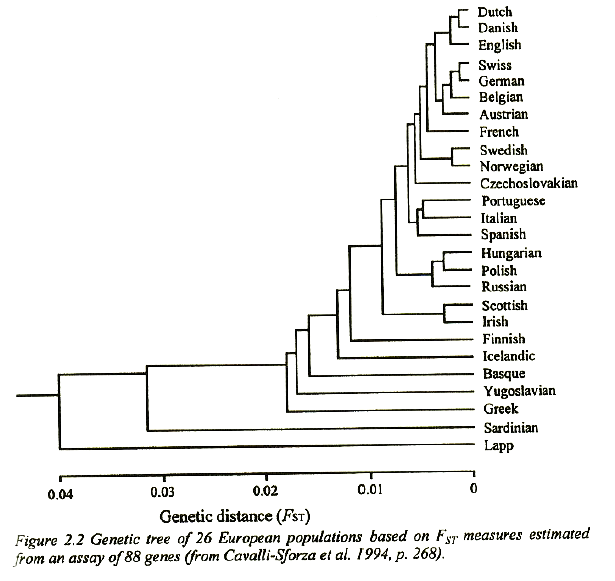
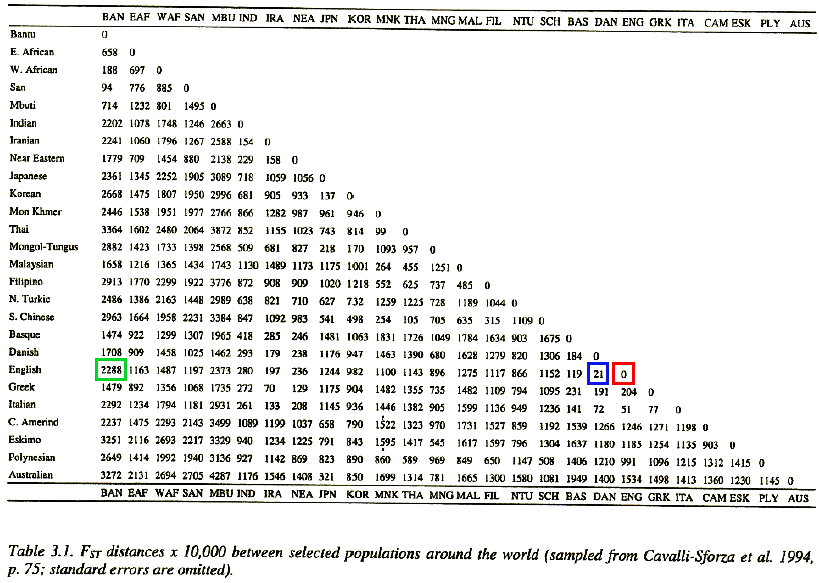
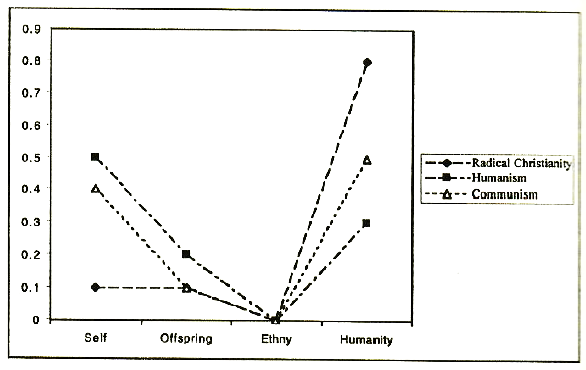
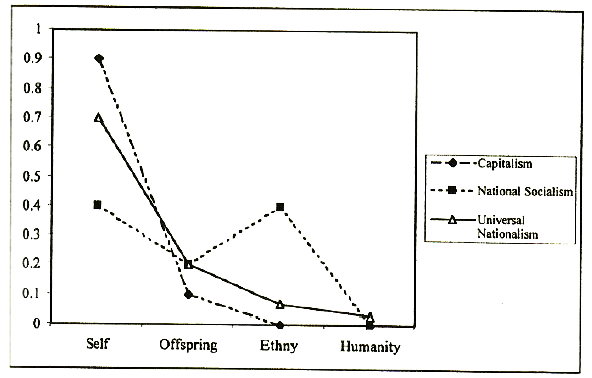

9 comments
It is impossible to overstate the fundamental importance of this issue.
I find the above comparison between White Nationalism 1.0 and 2.0 quite reasonable. Obviously, if we want a peaceful world in the future, all races will need to be more universally nationalistic, so to speak. For us all to be chauvinistic or expansionist would be a recipe for constant war. I just reject the term “universal nationalism” as confusing. It sounds like a world-nation nationalism. I would simply call it non-supremacist/non-imperialist racial nationalism or merely separatist racial nationalism.
Right. ‘Universal Nationalism’ is Salter’s term, so I ran with it. I think ‘Universal Ethnonationalism’ would be a more appropriate descriptor.
There is extended discussion of Frank Salter’s work and this book in Mike Polignano’s “Taking Our Own Side”, which is available from C-c down the sidebar.
I would recommend to anyone to buy this book, Taking Our Own Side. It is cheap and accessible. It is a good first book. It helped me when I was first sorting out my thoughts on the ethics of being pro-White. It might help other White people too.
The third chapter of Taking Our Own Side, The Ethics of Racial Preservation, introduces and argues with Frank Salter and On Genetic Interests. That is a fundamental text that lives up to the review of it here.
I would recommend On Genetic Interests to any pro-White. It is worth investing some money and some reading time to sort out the factual foundations of your morality regarding group interests.
Until we understand that the morality of upholding our own group interests as a race is reasonable and rationally well-founded, we’re helpless. Thinking it’s irrational to defend our race, the White race, confuses us and it makes us useless to the people who have the most right to our altruism.
We don’t want to be useless people. We want to be useful people.
Taking Our Own Side was how I first heard of Salter many years ago. Excellent book.
Thank you for the book recommendations.
“Until we understand that the morality of upholding our own group interests as a race is reasonable and rationally well-founded, we’re helpless.” The CC family understands this better than anybody but how does one convince people, especially abused White youth who are bombarded with sinister propaganda 24/7, that our takes are not immoral but essential? I’ve abandoned hope for the ‘israel is our greatest ally’ X-tian zionist liege who adore the jewishry almost as much as the tribe hates their guts (more than a few have told me so). I don’t want more Whites whose future is bleak enough to only realize what we know after burying their family. Or a more alarming trend I’ve noticed are craven Whites forgiving blacks, who’re laughing at them in court till they’re released and repeat, like the mother whose son was thrown from the railing at the mall. I’ve concluded that people like this do not take these atrocities against their own kin nor the scum responsible seriously at all, and I’m beyond exhausted by the feebleness and dying on swords as slavish doormats, but they’ll rush to the immediate defense of a protected group whose infallibility is enshrined. I don’t know how one gets through to these types or their cloud heads.
re: Uncle Semantic,
I have a reputation for counter-signalling the 14/88 and Christian Right consistently, and with good reason.
In my experience, while many liberals are closet racists, many online racists are actually closet racial egalitarians who want to exclude liberal whites from society whilst welcoming socially conservative, anti-semitic nonwhites (some of the loudest voices of this crowd are nonwhite themselves, and therefore want to reduce being white to a question of religious and sexual morality).
I believe there is a large and silent contingent of liberal whites who are open to white nationalist ideas and white advocacy, so long as it is not conflated or bait-and-switched with moral compliance. Many whites, including myself, consider a liberal society a must, but a normatively white society a nice-to-have.
Zoomers are especially zealous about personal autonomy, and with good reason – they have extremely dim economic prospects and pitiful wealth and savings relative to previous generations. As such, any Rightist attack on Leftist civil rights positions will meet especially ferocious resistance from this demographic.
I was a vocal Yang-gang supporter back on Twitter and still rock the pink Yang hat on my Gab profile, as I think that raising the material conditions of whites as a whole is far more important than pushing a racially-based aristocratic / NS mentality or belief system. I think that white advocacy should be de-coupled from Christianity and Nazism and become accessible to all whites, especially traditionally leftist and counter-culture demographics. When white nationalist viewpoints have a toehold across the entire political spectrum, rather than within just a racialist moral framework, more whites will be willing to jump on board. After all, politics is about policy, and is therefore transactional.
White Nationalists (in my opinion) should focus on framing racial concerns in a material way, like reducing competition for labour and reducing racially motivated crime of which whites are the targets. A large part of this is making sure that whites understand that they are often targeted because they are white, not just in crime, but in terms of reducing the ability of whites to unionise to protect their standard of living – something that is literally doctrine within the offices of Amazon, where diversity was shown to correlate inversely with unionisation. Sadly, the far Right scene has plenty of voices that consider alienating the majority of whites a priority (for example, 70% of all Americans support gay marriage, even 1 in 3 evangelicals) and want to gatekeep the concrete, material question of white advocacy as a moral and quasi-religious concern.
It should be the most common sense that maintaining territorial ethnic homogeny is critical. What the leaders of the West have done to us in our homelands is an unimaginable crime.
There is one, “Western democracy”, in the world today that explicitly defends its border and ensures ethnic homogeny in its homeland and even deports non-compatible (genetically or culturally), populations – Israel. We must bring this issue to the forefront of the information war. We must pressure Israel and the Jews into addressing the moral double standard they live by. The one, “Western”, nation that does what we do not. We must bring pressure on them to address this. Either their way is immoral, and thus they take migrants, or in refusing, the Jewish pressure and funding for our replacement is rejected by them and thus our claim to the same territorial sovereignty for our ethnos is reinforced by their moral claim.
That isn’t to say our claim isn’t valid without their moral validation. But we must make our people more broadly aware that Israel’s policy toward its territorial sovereignty and peoplehood is in direct contrast to our own. There is another, “Western”, nation whose policy matches the policy of our people. There is ruling regime that defends its people and recognizes its primary ethnos. We must show our people how the stark contrast between their policy and the rest of the West.
Comments are closed.
If you have Paywall access,
simply login first to see your comment auto-approved.
Note on comments privacy & moderation
Your email is never published nor shared.
Comments are moderated. If you don't see your comment, please be patient. If approved, it will appear here soon. Do not post your comment a second time.
Paywall Access
Lost your password?Edit your comment